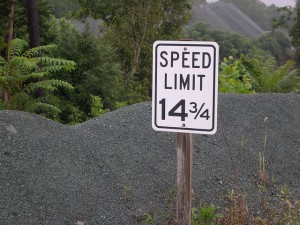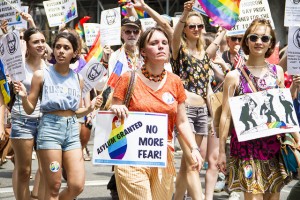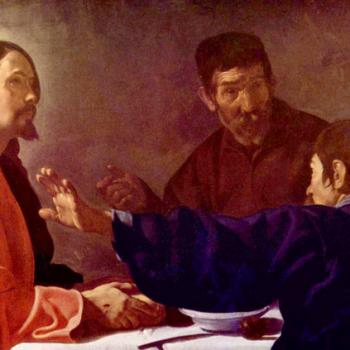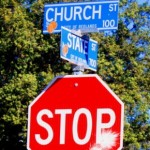I love North Carolina.
In the days of my misspent youth my dad was in the Navy. This meant that the places I slept were temporary way stations and that “home” was some elusive place that belonged to other people. North Carolina was where my grandparents lived. It was the place we kept returning to summer after summer, Christmas after Christmas. It was as close as I had to home.
Between college and grad school I managed to attend three of North Carolina’s ACC schools and teach at a fourth. I think I’ve managed to spend to spend a quarter of my life there, which is more than any other state’s claim on me. Most of my family lives there, and there’s something that goes pitter-patter in my heart every time I fly into NC and see the beautiful mountains and massive canopies of trees.
But over the past few years I’ve done more shaking my head at NC politics than I care to remember. And no week has been worse than last. The law-makers in North Carolina are afraid. And it’s a reflection of a broader fear response pouring out across the U.S.
Last Week
Last week North Carolina crossed my news feed over two decisions. And it struck me that both were grasping at control. 
The first was more of the Facebook news variety: the state Department of Transportation has decided that the speed limit is actually the limit and that a statewide crackdown will start giving tickets to anyone traveling as little as 1 mile per hour over the posted limit.
This is the State. It is an initiative of the “governor’s highway safety program.”
The notion that this has anything to do with safety is laughable. This is not about safety. It’s about control.
The second issue was much more serious. In response to the City of Charlotte creating legal protections for LGBT people, the State Legislature called its first special session in 35 years in order to create a state law that supersedes any local non-discrimination ordinances.
To the surprise of no one, the law omits protections based on sexual or gender identity.
Of course, religious non-descrimination is protected, so this law creates a loophole for religious people to discriminate against their LGBT neighbors, would-be patrons, etc.
The controversy that led to the passage of the bill had to do with bathrooms. Charlotte had just passed a bill protecting the right of transgender people to use the restrooms corresponding to their gender identity.
The state legislature wanted to make sure those protections did not go into effect.
Fear
These laws have fear written all over them.
In the case of the discrimination reinstatement act fear is very much on the surface of the debate. People are worried about their daughters using bathrooms and changing rooms with people who have penises.
Of course, the whole reason for the law is that someone whose gender expression is female being forced to use a men’s restroom is in a dangerous situation where physical violence is a high likelihood and some sort of bullying is virtually guaranteed.
But the fear driving this bill is deeper than the fear of who North Carolina’s children will have to share a restroom with. It is a larger fear of the world becoming something new and uncertain.
It is a fear smoldering in the abortion issue for the past 25 years.
It is a fear that has been stoked by having a black man in office.
It is a fear fanned into roaring flame by the rushing winds of gay equality.
It is a fear flaring up every time the media fuels our realization that we have criminalized race.
A massive cultural shift is underway. The ground feels like it is shifting beneath our feet. The world is not going to be in our children’s generation what it was in ours.
The flames don’t feel like they’re flames of fear coming from within. They feel like they are a coming conflagration threatening to burn down everything we’ve built.
When the world seems out of control we humans have a couple of predictable reactions. Loss of control is at the root of our anger. Loss of control is at the root of our fear. Loss of control creates pangs of loss.
Grasping for Control
Anger and fear, loss and pain.
I see the speeding-ticket threats and the discrimination reinstatement act as twin expressions of the same fear. The world is out of control. And many of us are reaching out for ways to put the fire out, or at least to keep the world from spinning.
The speeding enforcement foolishness has this written all over it. How do we retake control of a world that is slipping from our grasp? Create a new enforcement of a law that it already in place. Reinterpret it to mean exactly what it means on the books. Take away the cultural interpretation which has said that 1-9 miles per hour over the limit is still within the law.
Clamp down on interpretation. Clamp down on enforcement.
When the world is spinning out of control, create a new law. See the place where the world is changing and roll back the clock. Make it the world we knew and grew up in and were comfortable with.
Make it the world where white is white and black is black. The world where straight is straight and gay is crooked. Make it, once again, the world where we are right and they are wrong. 
The discrimination reinstatement act is all about fear.
Of course, anyone following the Republican primaries can connect the dots and see that this fear is in no way limited to the State of North Carolina. White, culturally conservative, “Christian,” middle-America, working-class culture has lost its hegemony. There is a sense of profound loss. There is a sense that liberal urban culture has overrun the values that make America great.
People feel a loss of control, an anger and a fear, a loss and a pain, that is being given voice by an opportunist who knows how to express anger and assert control.
Christians, Too
It doesn’t take much cultural awareness to realize that we in the church do not form a distinct culture. We live in different Christianized versions of the broader culture that is America. A Presbyterian New Testament professor in Pittsburgh makes serious arguments in favor of Ted Cruz’s candidacy on his Facebook page while a nominally Presbyterian New Testament professor in San Francisco really hopes Bernie’s recent wins translate into overtaking Hillary.
We reflect the culture.
And Christians, too, turn to law enforcement in times of disorientation.
In the guild this has happened in the scholarly discipline of theological interpretation. It created a way to keep saying the same things we’ve always said in the face of a shifting culture, shifting scholarship, shifting knowledge that all undermine the conclusions of previous generations.
No worries. We’ll just restate these rules. We’ll just enforce them in ways they have never been enforced before. We’ll draw up our theological strictures and protect what has always been. Right will continue to be right. White will continue to be white. Black will continue to be black.
And if that doesn’t work, we’ll start a new denomination. Of course, its purpose will always be about mission. But underneath that veneer will be the reassurance that we can still hold to inerrancy, still prohibit women from preaching, still reject the Spirit’s gifts to our gay siblings.
This has happened before, of course. With the onset of modernity the Fundamentals became a rallying cry for those who would not leave behind what they had always known.
In our times of disorientation and anger and fear we find ways to control.
From Destruction to Life
The problem with fear and anger is that they become powerful engines of our fight or flight systems. Socially, and sometimes physically, we feel the overwhelming compulsion to destroy. We think that destroying will solidify our position. That it will make us safe.
But destruction is a double-edged sword. With one side we strike down our enemy and with the other we destroy ourselves. It doesn’t take physically killing someone to split our own souls, though J. K. Rowling is onto something if we have ears to hear.
Several years ago I had a chance to hear Miroslav Volf speak on being a faithful Christian in the political arena. What he said was so bleedingly obvious in retrospect that I was somewhat ashamed for not having distilled it before.
While we can’t script laws to uphold our religious particularities and enforce compliance by our fellow citizens, we can act as deeply Christian people in the political sphere. It works like this: we love our neighbors as ourselves and do unto them as we would want done to us.
There is a way to grab hold of that deep desire for control that is, in fact, life-giving.
There is a way to grab hold of that instinctive safeguard of a law that will lead us to the flourishing we all yearn for.
In both the biblical book of 1 John and the Deuterocanonical Frozen we learn that the antidote to fear is not more fear, is not the power to destroy, but love.
Or, in the words of Martin Luther King, Jr., “Darkness cannot drive out darkness, only light can do that. Hate cannot drive out hate, only love can do that.”
The life lesson that looms is not whether or not we can figure out how to manipulate the political process to get what we want. I’ve seen that in action. Some people are quite gifted at it. And it does not bring about the life and flourishing of either persons or communities at we are all striving for.
The question before us when we feel out of control is not how can I get control at whatever cost. That is the question that leads to life-sapping destruction of our neighbors in our vain attempts to find life for ourselves.
What this past weekend should have taught us is the opposite.
In that moment when I know who my enemy is, that’s when I know who I am called to love. That’s when I’m called to know who I am to die for. That’s when I know the one for whom my fears and yearnings for what I want to cling to must be set aside in order to give myself so that my neighbor might live.
Fear is a disease whose infection spreads far beyond the state of North Carolina.
But is a disease whose antidote is also universally available.
As long as we keep attempting to fight it by lopping off the heads of our enemies we will find that the heads have redoubled. We cannot win that way.
Our deepest instincts tells us that in moments of disorientation, of fear and helplessness, the way forward is to seize what was taken.
This has never led to life.
The Easter story invites us to try the still more excellent way. It invites us to entrust ourselves to God in the act of loving our neighbor. It invites us to the faith that God will be the one to cause new life to spring up both within ourselves and in that neighbor/enemy whom we have served.
North Carolina is putting this on full display for us right now. To seize our own good is to destroy the life of our neighbor. To seize a sense of control can ruin the lives of all.
Speed Limit Photo: © Chris Dilworth | flickr | CC 2.0
NYC Pride Photo: © Kasya Shahovskaya | flickr | CC 2.0











